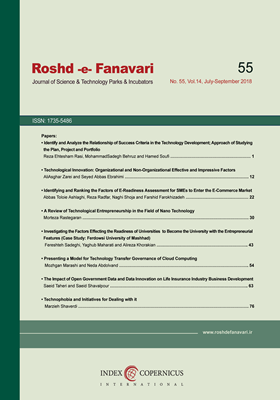Technophobia and Initiatives for Dealing with it
Subject Areas : مديريت تکنولوژي
1 - University of Science and Technology
Keywords: Technology Technophobia Technology Perception Technology Effects Technological Experience,
Abstract :
In today's world, the use of hi-tech and up-to-date technology is inevitable; especially with regard to the country's path to knowledge-based and innovation economy. Technology is emerged in various aspects of human life and has many social and economic effects. But dealing with new technologies, along with its particular attractiveness of it, has always been with fear. The fear of losing a job position, fear of changing the behavior of people, fear of inability to work with technology and fear of unwanted and unknown effects of technology on individual and social life are always accompanied by the emergence of new technologies. The term "technophobia" was first introduced in 1947 to describe this panic. Technophobia, by creating resistance among technology adopters, delays the adoption of technology by a large number of people. In Iran, technophobia has been shown in many ways and with the emergence of various technologies; by the introduction of cars and their replacement with the gharries to the video player, mobile phone, information and communication technologies, biotechnology and mobile-developed businesses. So, familiarity with this concept and solutions to overcome, is necessary to take the path of technological development and move towards the knowledge economy. This paper is based on the library research methodology. After reviewing the history, definitions and the reasons for technophobia and its examples in Iran are presented. At the end, some solutions are proposed to deal with it.
1- هوشی محمدرضا، «بررسی اثرات تكنو فوبیا (فناوریهراسی) بر بهرهوری سازمانی (تحقیق موردی: سازمان پاركها و فضای سبز شهرستان اهواز)»، ارائهشده در اولین همایش علمی ـ پژوهشی یافتههای نوین علوم مدیریت، كارآفرینی و آموزش ایران، تهران ـ انجمن توسعه و ترویج علوم و فنون بنیادین، 1394.
2- خوشنودیراد بینه، «محصولات تراریخته؛ تهدید یا فرصت؟»، اینترنت: yon.ir/uxFD7، 1394، [23 آذر 1396].
3- Merriam-Webster, “Definition of TECHNOPHOBIA”, Internet: www.merriam-webster.com/dictionary/technophobia, [Dec. 17 2017].
4- Gyu Ha Joong, Page Tom, Thorsteinsson Gisli, “A Study on Technophobia and Mobile Device Design”, International Journal of Contents, vol. 7 (2), pp.17-25, June 2011.
5- Szajna B., “An investigation of the predictive validity of computer anxiety and computer aptitude”, Educational and Psychological Measurement, vol. 54 (4), pp.926-934, 1994 (Cited in Gyu, Page, Thorsteinsson 2011).
6- Shaw S., “Harris Poll shows public is high on computers”, Mini Micro systems, vol. 17, pp.55, Feb 1984 (Cited in Gyu, Page, Thorsteinsson 2011).
7- Rosen, L.D., Sears, D.C., Weil, M.M., “Computerphobia, Behaviour Research methods”, Instruments and Computers, vol.19, pp.167-179, 1987 (Cited in Gyu, Page, Thorsteinsson 2011).
8- Auvinen Heidi, “Technophobia – fear of technology”, Internet: goo.gl/r9vUgo, 2017, [Dec. 14 2017].
9- Aquilina Conrad, “Exploring the extent of Technophobia: a study conducted in the Maltese Public Service”, M.A. thesis, University of Derby, UK, 2011.
10- Martínez-Córcoles Mario, Teichmann Mare, Murdvee Mart, “Assessing technophobia and technophilia: Development and validation of a questionnaire”, Technology in Society, vol. 51, pp. 183-188, 2017.
11- Rheingold, H., “Smart Mobs; the Next Social Revolution-Transforming Cultures and Communities in the age ofInstant Access”, Cambridge, MA, USA, 2002 (Cited in Gyu, Page, Thorsteinsson 2011).
12- Agar, J., Constant Touch- A Global History of the Mobile Phone, Icon Books Ltd, Cambridge, 2004 (Cited in Gyu, Page, Thorsteinsson 2011).

